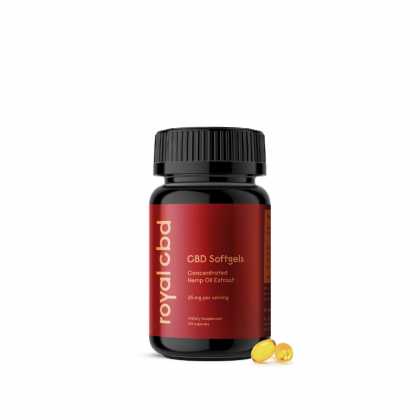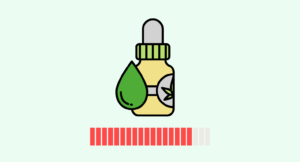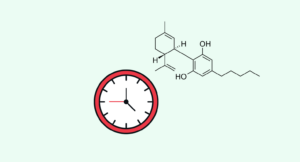| Total CBD: | 750 mg |
| Potency: | 25 mg per Capsule |
| Cost per mg CBD: | $0.11 |
| Extract Type: | Full-Spectrum |
| THC Content: | <0.3% |
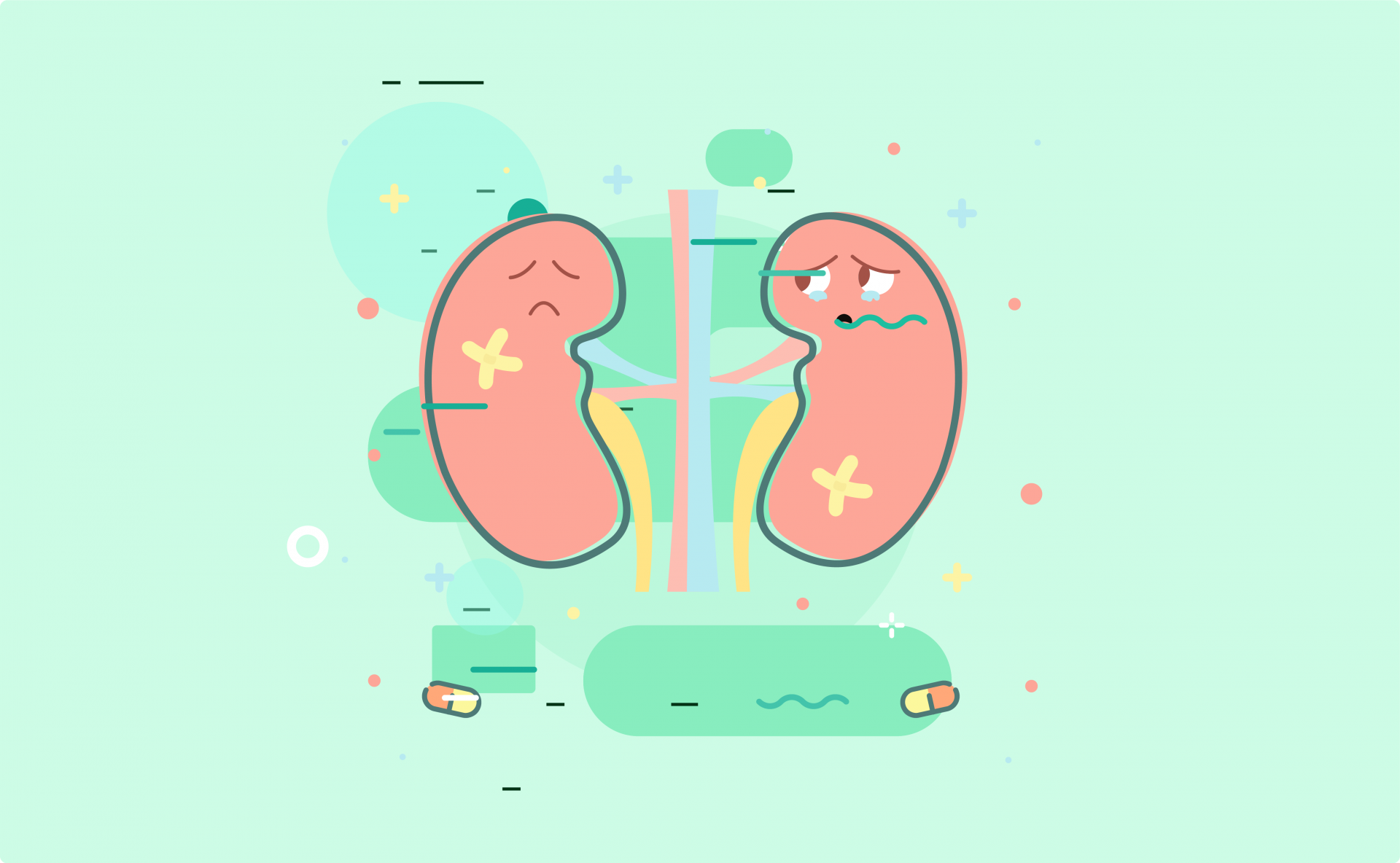
Evidence based
CBD Oil for Kidney Disease: Benefits, Side Effects, and Dosage
CBD may provide support for kidney disease through its anti-inflammatory, antioxidant, and analgesic benefits.
But there are some limitations to be aware of.
Here’s how you can get started using CBD oil today.
Kidney disease is the ninth most common cause of death in the United States.
According to research conducted by the American Kidney Fund, roughly 10% of the American public are believed to suffer from chronic kidney disease.
In this article, we’ll explore how to use CBD as a supplement for chronic kidney disease, how it works, and when you should avoid it.
Let’s get straight into it.
Summary: Using CBD for Kidney Disease
Cannabis could be a useful aid in managing certain symptoms of kidney disease — which often includes chronic pain, nausea, emesis, anemia, itching, insomnia, and an overall lack of well-being
There’s evidence that CBD and other related cannabinoids can support the health of the kidneys during both acute and chronic kidney disease in mice — though this has yet to be confirmed with research on humans.
One of the main advantages of using CBD over other pain medications is that it doesn’t cause any additional damage to the kidneys.
Other pain medications — such as acetaminophen or opiate medications — are metabolized by the liver and eliminated through the kidneys. These drugs have been shown to cause damage to the sensitive cells making up the kidneys, which can lead to a worsening of the condition.
CBD is also metabolized by the liver but has been proven not to cause additional damage to the kidneys — making it a non-toxic option for managing kidney-related pain.
The Benefits of CBD for Kidney Disease:
- Potentially reduces pain associated with common side-effects of kidney disease
- May slow the progression of kidney disease
- Studies suggest it may lower inflammation of the kidneys
- Could help protect the kidneys from oxidative damage
What’s the Dose of CBD Oil?
Kidney disease is a severe disease so any potential treatment options should be discussed with a medical doctor. This condition can quickly lead to serious consequences.
With that said, many people with kidney disease are turning to CBD as an adjunctive treatment option along with other medications and diet/lifestyle modifications.
Finding the right dose of CBD can be a challenge, as the compound affects everybody differently.
Unfortunately, there isn’t much research highlighting the effective dose of CBD for kidney disease — most of the research done up to this point has been investigating the safety of using CBD with kidney disease (which is positive) and animal testing to explore how it works.
We can use dosage information from similar conditions, such as liver or cardiovascular disease which involve similar mechanisms of action. Usually, these conditions require higher doses of CBD to produce effects.
Therefore, it’s likely that the dose of CBD should be on the higher end of the spectrum to be useful for kidney disease.
Whenever using CBD (or any supplement for that matter) for the first time, it’s essential that you start with a small dose, and build up gradually over time once you know how it affects you individually.
We recommend starting at the low-strength dose and build up slowly over time to the medium or high-strength doses.
Calculating CBD Dosage Strengths By Weight
| Unit of Measure | Low Strength | Medium Strength | High Strength |
| Imperial (pounds) | 1 mg every 10 lbs | 3 mg every 10 lbs | 6 mg every 10 lbs |
| Metric (kilograms) | 1 mg every 4.5 kg | 3 mg every 4.5 kg | 6 mg every 4.5 kg |
Using this information, you can calculate what a low dose, medium dose, or high dose of CBD may look like.
To simplify this for you, we’ve included a dosing chart based on weight and desired strengths.
CBD Dosage Calculator
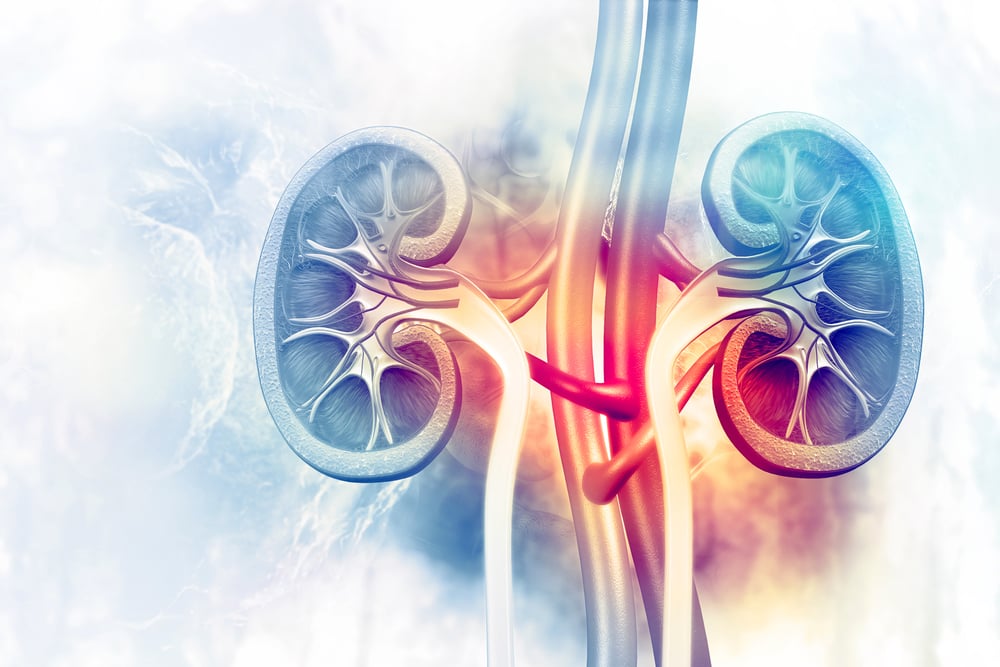
Guide to Using CBD for Kidney Disease
Although no clinical studies investigating the specific role of CBD and other cannabinoids in the kidneys exist — there is evidence that CBD may be able to protect the kidneys from damage or slow the progression of kidney disease in animal models [1].
The endocannabinoid system is abundant throughout the body. Nearly every organ in the body has either CB1 or CB2 receptors — many even have both.
The kidneys have both of these receptors, suggesting the endocannabinoid system plays a role in the function of this important organ. Precisely what this function involves is still under dispute.
It’s believed that the endocannabinoid receptors are involved with managing damage to the organ, more than they are a specific function. This is also how the endocannabinoid system functions in the liver. The endocannabinoid system doesn’t appear to become active until there’s damage in the organ itself.
It’s thought that the endocannabinoid system plays a supportive — even defensive — role in this organ when the disease starts to develop.
What The Research Says: CBD For Kidney Disease
One study gave mice a toxic dose of cisplatin (a compound known to cause irreversible kidney damage), and CBD to test whether it would protect the kidneys from damage or not.
Three days after treatment researchers noted that mice given CBD had significantly less inflammation, tissue death, and reduced function in the kidneys [1].
What is Kidney Disease?
The kidneys are responsible for filtering compounds out of our bloodstream. They continuously filter water and compounds out of the blood — they decide how much of these filtered compounds they should put back into the bloodstream.
The entire process is designed to maintain a balance in the blood. Everything from blood pH to blood pressure relies on healthy kidney function to remain within the optimal range. The kidneys are also involved in maintaining homeostasis through the release of hormones such as erythropoietin, calcitriol, and renin.
Kidney disease can be acute or chronic (>3 months), and comes in progressive stages depending on the cause. Kidney injury can result in a loss of normal kidney structure and/or functions, such as filtration.
Any problems with the kidney can quickly cause widespread issues throughout the body. Toxic compounds may build up in the bloodstream, blood pH can become altered (which can be fatal), and blood pressure may begin to rise out of control.
Symptoms of Kidney Disease
- Sleep problems
- Loss of appetite
- Muscle cramps
- Swelling of feet and ankles
- Chronic pain
- Fatigue
- Swelling in the face, wrists, or abdomen
- Foamy urine
- Dark-colored urine
- Burning sensation on urination
- Decreased urinary frequency
- Mid back pain
- Hypertension
- Itchiness
- Poor concentration
- Darkened skin
- Uremic frost
- Nausea/Vomiting
- Osteodystrophy
- Lowered Immune Function
The Risks of Kidney Disease
- High blood pressure
- Heart failure
- Hyperkalemia
- Uremia
- Anemia
- Bleeding disorders
- Acidosis
- Hypercalcemia
- Hyperparathyroidism
- Skin disorders
- Lowered immune function
- Sexual debility
- Neurological disorders
- Death
How is Kidney Disease Diagnosed?
Kidney disease is diagnosed through numerous tests and scans, along with consideration of family history, and presenting symptoms.
The hallmark sign of reduced kidney function is something called estimated glomerular filtration rate (eGFR). This metric refers to the amount of fluid that can pass through the kidneys. If the eGFR number is low, it means the kidneys aren’t functioning at their full capacity.
Interpreting eGFR With Kidney Disease
- Above 90 eGFR — optimal kidney function
- Between 60 and 89 eGFR — mild kidney dysfunction
- Between 30 and 59 eGFR — moderate kidney dysfunction
- Between 15 and 29 eGFR — severe kidney dysfunction
- Anything less than 15 eGFR — kidney failure
Other Signs of Kidney Failure
- Low urate levels
- Low creatinine levels
- Low urea:creatinine ratio
- High urinary calcium
- Low urinary phosphate
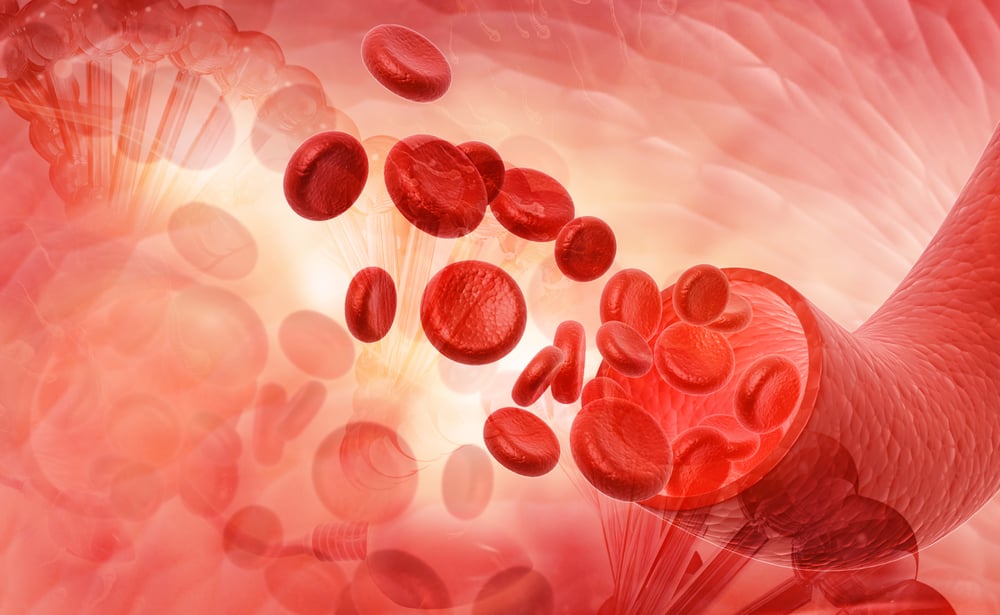
What Are The Causes of Kidney Disease?
The kidneys play an essential role in regulating blood pressure and filtering waste materials out of the bloodstream. As a filter, the kidneys are incredibly precise — filtering out compounds on a microscopic level. The functional unit that does the filtration is called a nephron.
There are around 1 million nephrons in each kidney, working in overtime to pull compounds out of the blood as it passes through the kidneys. In a single day, the kidneys filter around 180 liters of blood.
The nephrons in the kidneys are very sensitive and are easily damaged in the presence of toxic compounds in the blood.
For example, one of the two most common causes of kidney disease is diabetes. High blood sugar levels involved with diabetes can damage tissues all around the body — including the sensitive nephrons of the kidneys.
Hypertension is the other most common cause of kidney disease — by reducing the blood supply to, and the autoregulatory sensitivity of, the kidney.
As nephrons become damaged, it increases the strain on remaining nephrons, further increasing the chances of becoming damaged.
Common Causes of Kidney Disease
- HIV/AIDS
- Lupus
- Hepatitis B
- Hepatitis C
- Iatrogenic damage
- Diabetes
- High blood pressure
- Heart disease
- Smoking
- Obesity
- Excessive use of NSAID medications
- Use of nephrotoxic medications or compounds
How is Kidney Disease Treated?
The goal of kidney disease treatment is to prevent the progression of the disease to the end-stage. This can be slowed or prevented by treating underlying conditions like diabetes or HIV, and also controlling blood pressure with several medications.
As kidney damage progresses, patients may need to go through regular dialysis treatments to provide artificial filtering of the blood. Kidney transplants are also used for advanced kidney disease, and provide the best long-term outcomes.
Common Medication Options for Kidney Disease
- Opiates — to manage pain
- Anti-hypertensives — to control high blood pressure and prevent further vascular damage
- Diuretics — to lower blood pressure and prevent fluid overload
Because using CBD with these medications can cause adverse effects, it’s important to check with your doctor first.

Final Verdict: CBD for Kidney Disease
Kidney disease is a serious, life-threatening disease involving a loss of function in the kidneys.
Due to the critical role the kidneys play in regulating homeostasis and filtering toxic metabolic byproducts from the bloodstream, kidney failure can quickly result in significant side-effects or death.
Although CBD has been shown to be safe for kidney disease, and may even provide beneficial effects on the progression of the disease, it’s important to consult with your doctor before using CBD or any supplement.
Do not stop taking your prescribed medication unless your doctor tells you to stop.
There is evidence that CBD can be used to manage pain involved with kidney disease, as well as the possibility of offering direct protective actions to the kidneys themselves.
More research is needed to determine the ideal dose for this condition. However, preliminary studies suggest that higher doses are necessary for this condition.
References
- Pan, H., Mukhopadhyay, P., Rajesh, M., Patel, V., Mukhopadhyay, B., Gao, B., … & Pacher, P. (2009). Cannabidiol attenuates cisplatin-induced nephrotoxicity by decreasing oxidative/nitrosative stress, inflammation, and cell death. Journal of Pharmacology and Experimental Therapeutics, 328(3), 708-714.
- Go, A. S., Chertow, G. M., Fan, D., McCulloch, C. E., & Hsu, C. Y. (2004). Chronic kidney disease and the risks of death, cardiovascular events, and hospitalization. New England Journal of Medicine, 351(13), 1296-1305.
- Coresh, J., Selvin, E., Stevens, L. A., Manzi, J., Kusek, J. W., Eggers, P., … & Levey, A. S. (2007). Prevalence of chronic kidney disease in the United States. Jama, 298(17), 2038-2047.
- Hampson, A. J., Grimaldi, M., Axelrod, J., & Wink, D. (1998). Cannabidiol and (−) Δ9-tetrahydrocannabinol are neuroprotective antioxidants. Proceedings of the National Academy of Sciences, 95(14), 8268-8273.
- El-Remessy, A. B., Al-Shabrawey, M., Khalifa, Y., Tsai, N. T., Caldwell, R. B., & Liou, G. I. (2006). Neuroprotective and blood-retinal barrier-preserving effects of cannabidiol in experimental diabetes. The American journal of pathology, 168(1), 235-244.
- Davison, S., & Davison, J. (2011). Is There a Legitimate Role for the Therapeutic Use of Cannabinoids for Symptom Management in Chronic Kidney Disease? Journal of Pain and Symptom Management, 41(4), 768–778. https://doi.org/10.1016/j.jpainsymman.2010.06.016
- Shi, M., McMillan, K. L., Wu, J., Gillings, N., Flores, B., Moe, O. W., & Hu, M. C. (2018). Cisplatin nephrotoxicity as a model of chronic kidney disease. Laboratory investigation; a journal of technical methods and pathology, 98(8), 1105–1121. doi:10.1038/s41374-018-0063-2
More Health Benefits to Explore
-
Conditions Related to Health Benefits
- CBD For Allergies: Can This Cannabinoid Ease Symptoms?
- Top 10 CBD Oils For Back Pain
- Can CBD Help With Menstrual Cramps?
- CBD for Sciatica: How It Works, Safety, Drug Interactions, & Best Products
- Is CBD a Viable Treatment for Cerebral Palsy?
- CBD Oil For Sleep
- CBD For Psoriasis: Can CBD Help to Alleviate Symptoms?
- Traumatic Brain Injury (TBI)
- Arthritis
- Anxiety & Depression
- Weight Loss
- ADD & ADHD
- Anorexia
- Alzheimer’s Disease & Dementia
- Addiction
- ALS (Amyotrophic Lateral Sclerosis)
- Antibiotic Resistance
- Asthma
- Atherosclerosis
- Autism
- Acne
- Bipolar Disorder
- Pain
- Crohn's Disease & Ulcerative Colitis
- Diabetes
- Epilepsy
- Endocrine Disorders
- Fibromyalgia
- Fatty Liver Disease
- Glaucoma
- Hypertension
- Heart Disease
- Huntington's Disease
- Inflammation
- Irritable Bowel Syndrome (IBS)
- Kidney Disease
- Migraine Headaches
- Muscle Recovery
- Multiple Sclerosis
- Motion Sickness
- Metabolic Syndrome
- Neurodegeneration
- Cancer
- Nausea
- Neuropathic (Nerve) Pain
- Osteoporosis/Bone Health
- Obsessive-Compulsive Disorder (OCD)
- Polycystic Ovarian Syndrome (PCOS)
- PTSD
- Prion/Mad Cow Disease
- Premenstrual Syndrome (PMS)
- Parkinson’s Disease
- Schizophrenia
- Sickle Cell Anemia
- Stroke
-
Conditions Related to Products
- Ranking The Top 13 THC Gummies By Category (Δ8, Δ9, Δ10, HHC, & More)
- Top 10 CBD Oils For Back Pain
- Everything You Need to Know About CBD Sunscreen
- Top 7 CBD Gummies For Sleep & Insomnia
- Top 7 CBD Gummies To Help With Anxiety (2022)
- Best CBD Gummies For Pain (Top-Rated Pain Gummies For 2022)
- Best Hemp Cigarettes (Top 5 Nicotine-Free Smokes)
- Top 5 CBD Lip Balms For 2022
- The Top 7 CBD Face Masks for 2022
- The Best CBD Inhalers For 2022 (& How to Use Them)
- Best Full-Spectrum CBD Vape Juice: What to Look For & How to Use It
- CBD Eye Drops: New Option For Glaucoma?
- CBD Oil For Dogs With Arthritis
- Best CBD Massage Oils In 2022
- Buyer's Guide To The Best CBD Vape Kits In 2022
- CBD Chocolate: Yes, It Exists & It's Just as Divine as it Sounds
- CBD Pre-Rolls & Cigarettes
- Terpene Concentrates
- Best CBD Soaps
- Best CBD Shampoo & Conditioner
- Best CBD Juul Pods
- CBD Isolate Oils
- Full-Spectrum CBD Oils
- Best CBD Lube
- CBD Honey
- CBD Transdermal Patches
- Best Dry Herb Vaporizers
- CBD Oil For Dogs With Epilepsy
- CBD Oil For Dogs With Anxiety
- CBD Oil For Dogs With Cancer
- CBD For Horses
- CBD Chewing Gum
- CBD Pain Cream
- CBD Oil For Cats
- CBD Oil For Dogs
- CBD Hemp Flower
- CBD Suppositories
- Best CBD Gummies for Pain, Sleep & Anxiety Reviewed (2022)
- CBD Teas
- CBD Vape Pens
- CBD Vape Oils
- CBD Coffee
- CBD Drinks & Shots
- CBD Crystals
- CBD Skincare
- Best CBD Oil & Gummies For Kids: Is CBD Safe for Children with Anxiety & ADHD?
- CBD Concentrates
- CBD Bath Bombs
- CBD Capsules
- CBD Sprays
- CBD Dog Treats
-
Conditions Related to Topicals
-
Conditions Related to Oils & Tinctures
-
Conditions Related to Edibles
- Top 7 CBD Gummies To Help With Anxiety (2022)
- Best CBD Gummies For Pain (Top-Rated Pain Gummies For 2022)
- CBD Chocolate: Yes, It Exists & It's Just as Divine as it Sounds
- CBD Honey
- CBD Chewing Gum
- Best CBD Gummies for Pain, Sleep & Anxiety Reviewed (2022)
- CBD Teas
- CBD Coffee
- CBD Drinks & Shots
- CBD Capsules
-
Conditions Related to Gummies
- Ranking The Top 13 THC Gummies By Category (Δ8, Δ9, Δ10, HHC, & More)
- Top 7 CBD Gummies For Sleep & Insomnia
- Top 7 CBD Gummies To Help With Anxiety (2022)
- Best CBD Gummies For Pain (Top-Rated Pain Gummies For 2022)
- Best CBD Gummies for Pain, Sleep & Anxiety Reviewed (2022)
- Best CBD Oil & Gummies For Kids: Is CBD Safe for Children with Anxiety & ADHD?
-
Conditions Related to Hemp Flower
-
-
Conditions Related to Terpenes
-
-
Conditions Related to Cultivation
-
Conditions Related to Concentrates
-
Conditions Related to Delta 8 THC
-
Conditions Related to Delta 9 THC
-
-
-
-
Conditions Related to CBD
- Everything You Need to Know About CBD Sunscreen
- Top 7 CBD Gummies For Sleep & Insomnia
- Top 7 CBD Gummies To Help With Anxiety (2022)
- Best CBD Gummies For Pain (Top-Rated Pain Gummies For 2022)
- Best Hemp Cigarettes (Top 5 Nicotine-Free Smokes)
- Top 5 CBD Lip Balms For 2022
- The Top 7 CBD Face Masks for 2022
- The Best CBD Inhalers For 2022 (& How to Use Them)
- Best Full-Spectrum CBD Vape Juice: What to Look For & How to Use It
- CBD Eye Drops: New Option For Glaucoma?
- CBD Oil For Dogs With Arthritis
- Best CBD Massage Oils In 2022
- Buyer's Guide To The Best CBD Vape Kits In 2022
- CBD Chocolate: Yes, It Exists & It's Just as Divine as it Sounds
- CBD Pre-Rolls & Cigarettes
- Best CBD Soaps
- Best CBD Shampoo & Conditioner
- Best CBD Juul Pods
- CBD Isolate Oils
- Full-Spectrum CBD Oils
- Best CBD Lube
- CBD Honey
- CBD Transdermal Patches
- CBD Oil For Dogs With Epilepsy
- CBD Oil For Dogs With Anxiety
- CBD Oil For Dogs With Cancer
- CBD For Horses
- CBD Chewing Gum
- CBD Pain Cream
- CBD Oil For Cats
- CBD Oil For Dogs
- CBD Hemp Flower
- CBD Suppositories
- Best CBD Gummies for Pain, Sleep & Anxiety Reviewed (2022)
- CBD Teas
- CBD Vape Pens
- CBD Vape Oils
- CBD Coffee
- CBD Drinks & Shots
- CBD Crystals
- CBD Skincare
- Best CBD Oil & Gummies For Kids: Is CBD Safe for Children with Anxiety & ADHD?
- CBD Concentrates
- CBD Bath Bombs
- CBD Capsules
- CBD Sprays
- CBD Dog Treats
-
-
Conditions Related to THC-O
-
-
Conditions Related to Joint Health
-
Conditions Related to Pain Disorders
- Top 10 CBD Oils For Back Pain
- Can CBD Help With Menstrual Cramps?
- CBD for Sciatica: How It Works, Safety, Drug Interactions, & Best Products
- Traumatic Brain Injury (TBI)
- Arthritis
- Pain
- Fibromyalgia
- Glaucoma
- Inflammation
- Kidney Disease
- Migraine Headaches
- Multiple Sclerosis
- Neuropathic (Nerve) Pain
- Premenstrual Syndrome (PMS)
- Sickle Cell Anemia
-
Conditions Related to Autoimmune Disease
-
Conditions Related to Cognitive Health
-
Conditions Related to Metabolic Disorders
-
Conditions Related to Psychological Disorders
-
Conditions Related to Muscles & Bones
-
Conditions Related to Nervous System
- CBD for Sciatica: How It Works, Safety, Drug Interactions, & Best Products
- Is CBD a Viable Treatment for Cerebral Palsy?
- CBD Oil For Sleep
- Traumatic Brain Injury (TBI)
- Anxiety & Depression
- ADD & ADHD
- Anorexia
- Alzheimer’s Disease & Dementia
- Addiction
- ALS (Amyotrophic Lateral Sclerosis)
- Autism
- Bipolar Disorder
- Epilepsy
- Huntington's Disease
- Inflammation
- Migraine Headaches
- Multiple Sclerosis
- Motion Sickness
- Neurodegeneration
- Neuropathic (Nerve) Pain
- Obsessive-Compulsive Disorder (OCD)
- PTSD
- Prion/Mad Cow Disease
- Parkinson’s Disease
- Schizophrenia
-
-
Conditions Related to Reproductive Health
-
Conditions Related to Hormones & Endocrine
-
Conditions Related to Skin Health
-
Conditions Related to Cardiovascular System
-
Conditions Related to Digestive System
-
Conditions Related to Genetic Disorders
-
Conditions Related to For Children


